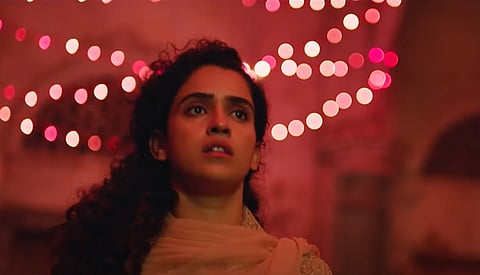

Starring: Sanya Malhotra, Sayani Gupta, Ashutosh Rana, Sheeba Chaddha, Shruti Sharma and Raghuvir Yadav
Director: Umesh Bist
Small films with a big heart are becoming quite the norm with recent Indian film releases on streaming platforms and this latest Netflix release, on the face of it, falls into that category.
Sandhya Giri (Malhotra) is struggling to come to terms with the grief of becoming a young widow, just months into a new arranged marriage. While her entire middle-class household has been turned upside down as a result of the very sudden and untimely death, she seems to be clearly stuck in a phase of limbo and numbness. The only person she can confide in is her childhood friend Nazia (Sharma), who has rushed down bag and baggage to be with her best friend in her hour of need.
Together the two friends try to make sense of all the complexities of grief, including the discovery of a photograph of the late husband’s ex-girlfriend Aakansha (Gupta) within his paperwork. Piece by piece it dawns upon Sandhya that she barely knew the man she was married to, albeit for a short time, and in the process, knew just as little about his extended family that begins descending upon the family home for the traditional 13-day Hindu death rituals.
It is in death and crisis that everyone’s true personalities come to light, including the deep anguish and money worries of her mother-in-law Usha (Chaddha) and father-in-law Shivendra (Rana). An ailing and dementia-stricken grandmother, Dadi, surprisingly proves the best companion to the newly-widowed Sadhya despite seemingly being unable to comprehend or communicate clearly.
MORE LIKE THIS…
This film weaves a complex web of emotions as it wades through the difficult subject of death and bereavement. While it does not overtly seek to preach for or against a particular form of grieving, it does hold up a mirror to some antiquated notions that may do more harm than good in the modern day. The dynamics of religious and caste divides are also played out subtly, but very effectively. Most poignantly, the audience is never introduced to the dead husband, Astik, even in flashback or in a token photograph. Yet, he pervades the entire plot as a dominant presence and symbolic of all that is intangible about the different stages of grief.
At the heart of it, this is a story of love and belonging and how that bond need not be defined only by blood ties. There is an underlying comment about the need for better understanding of mental health within society, as the craziness implied in the title of the film is completely turned on its head.
This one is a serious but worthy watch, not least for its attempt at some heart-felt storytelling.
* iGlobal Review Series